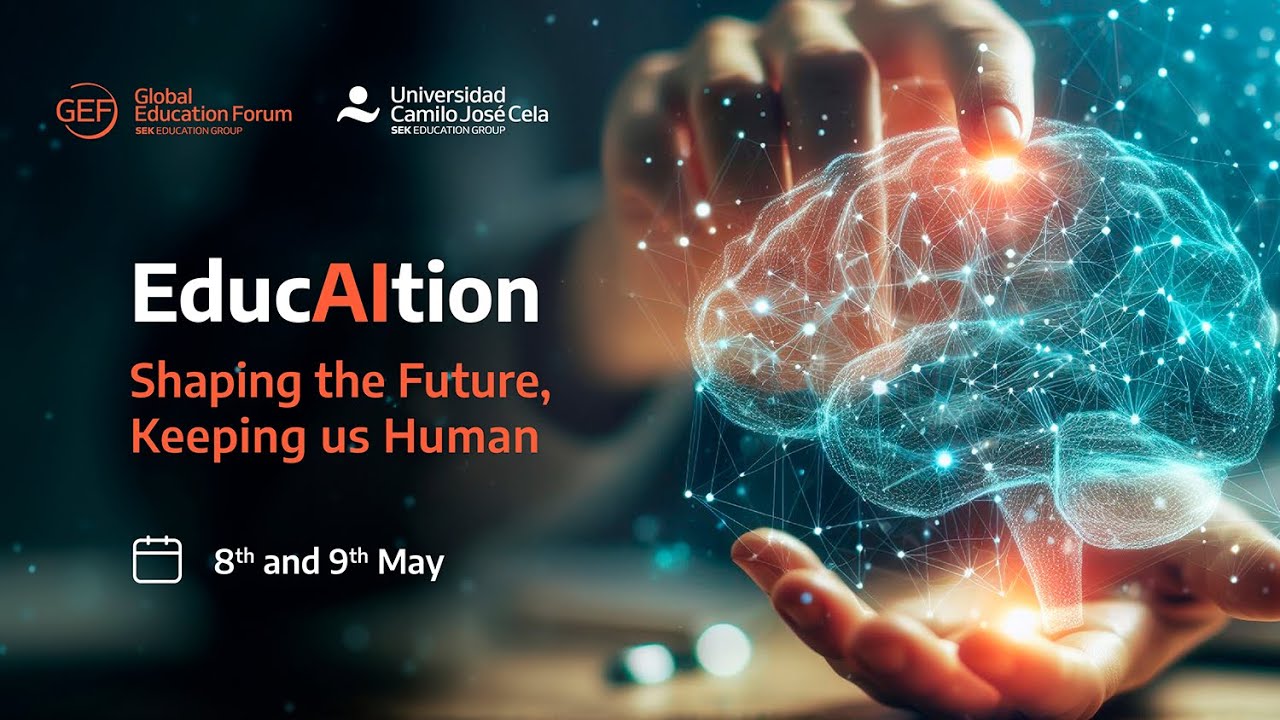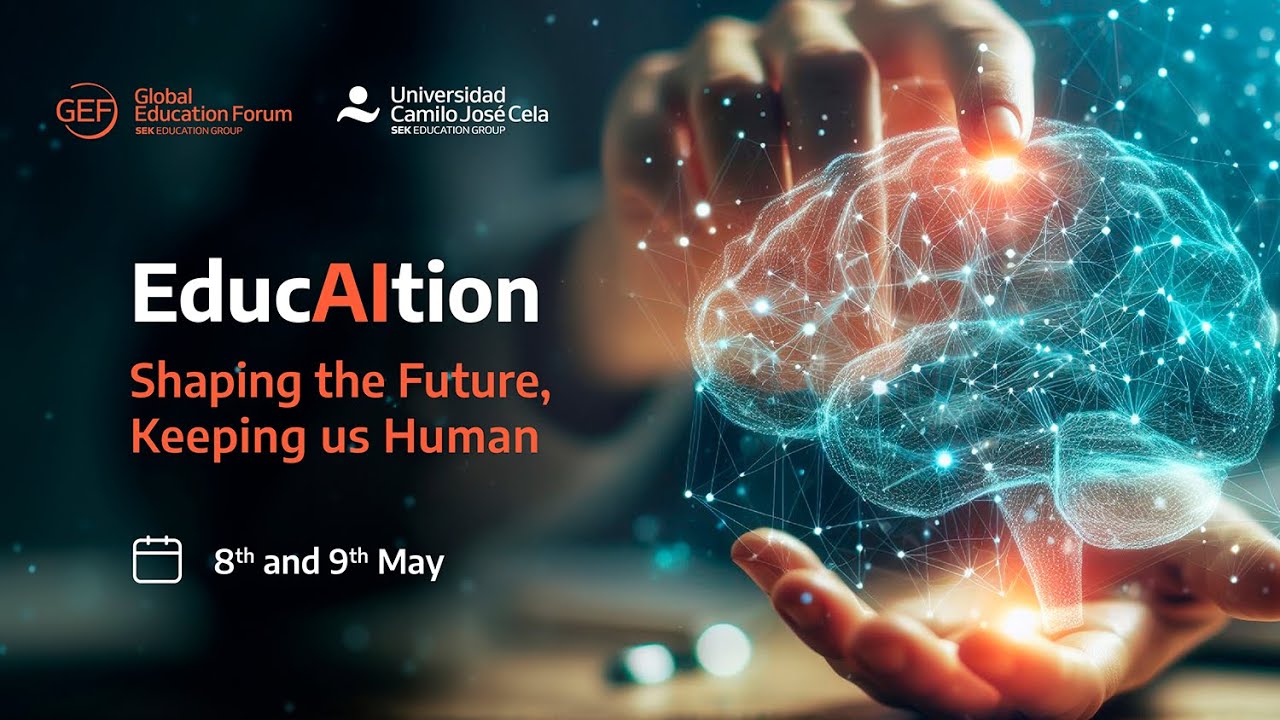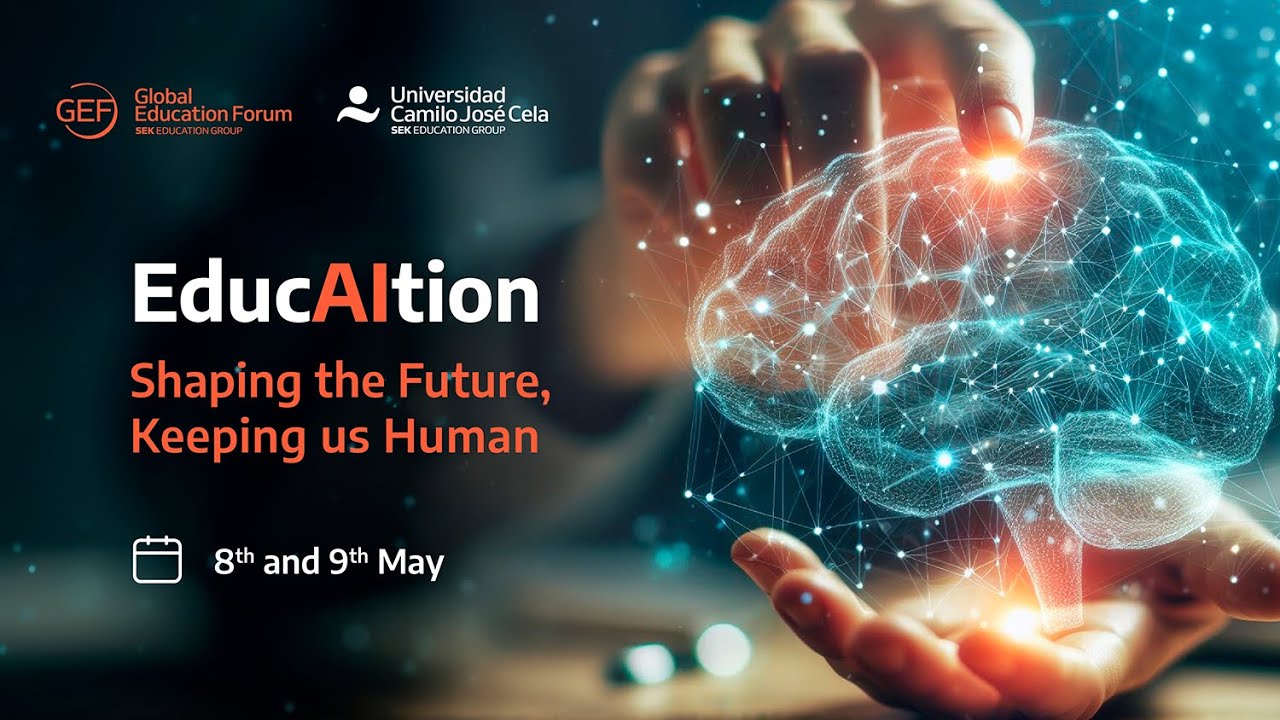GEF Madrid 2024: AI: Reshaping Academic Research
Summary
TLDRThe transcript from a roundtable discussion hosted by the Camilo José Cela University explores the impact of artificial intelligence (AI) on academic research processes. Experts from various fields deliberate on AI's potential to reshape research, influence scientific production, and enhance academic collaboration and innovation. The conversation touches on AI's role in improving research quality, the challenges of interdisciplinary research, and the necessity for universities to adapt and prepare researchers for the integration of AI technologies in their daily activities.
Takeaways
- 😀 The roundtable discussion focused on the potential of Artificial Intelligence (AI) to reshape academic research processes, influence scientific production, and improve collaboration between universities.
- 🧠 AI's role in analyzing and managing research results was highlighted, along with its capacity to potentially enhance academic collaborations and accelerate innovation and scientific discoveries.
- 🏆 Victor Pones discussed the use of AI in university rankings, emphasizing its utility in measuring research impact and detecting fraudulent citation practices.
- 🔍 Rubén San Segundo, a professor and researcher in artificial intelligence, spoke about AI's ability to reduce barriers in research fields, leading to increased multidisciplinarity and competitiveness in scientific research.
- 📚 The importance of AI in profiling universities for better partnerships and collaborations was mentioned, suggesting that AI can assist in matching staff and students with suitable universities.
- 🤖 The integration of AI in educational environments was a key topic, with Jordi Sager Mirir discussing AI's application in enhancing the educational process and training.
- 🔑 There was a consensus that while AI can facilitate research and education, it is not a substitute for human knowledge and expertise, and researchers must be adept in using AI tools effectively.
- 🔍 AI's potential to predict and optimize collaborations in research was discussed, with the idea that AI could identify the best interdisciplinary matches for research teams.
- 📈 The discussion touched on the need for universities to invest in training and infrastructure to prepare researchers to work with AI, emphasizing the importance of continuous learning.
- 🛠️ AI's ability to perform tasks in research was debated, with some participants expressing concern about the potential for AI to replace certain aspects of human research, while others were optimistic about AI's role as a tool to augment human capabilities.
- 🌐 The roundtable concluded with a philosophical reflection on whether AI can replace human knowledge in research, with participants expressing hope that AI will serve as an aid to human intellect rather than a substitute.
Q & A
What is the main topic of the roundtable discussion in the transcript?
-The main topic of the roundtable discussion is whether artificial intelligence will be capable of reshaping academic research processes, influencing scientific production, and accelerating innovation and scientific discoveries.
Who is moderating the roundtable discussion and what is their role in the university?
-Víctor Pones is moderating the roundtable discussion. He is a professor of pharmacology and the Vice-Rector of Research and Science at Camilo José Cela University.
What is Rubén San Segundo's area of research and what position does he hold at the university?
-Rubén San Segundo is a Full Professor at the Polytechnic University of Madrid, specifically at the School of Telecommunications. His research is related to artificial intelligence, focusing on speech technology, automatic learning, and the development of human-machine interfaces.
How does the University Ranking system utilize AI to measure research performance?
-The University Ranking system uses AI to rank universities based on performance, including research as a key component. AI helps in achieving a fair measurement of research by not only considering the number of citations but also the source and detecting fraudulent activities in the citation system.
What is the role of AI in profiling universities for better partnerships and collaborations?
-AI is used to profile universities in order to suggest better partnerships and collaborations. It helps in identifying which university or staff and students would be the best fit by analyzing data and creating a fair platform for scoring universities worldwide.
What is the concern regarding the increase in scientific production due to AI and its potential impact on research quality?
-The concern is that the increase in scientific production due to AI might lead to a decrease in research quality, with a potential rise in mediocre research. However, the responsibility lies with the review processes and scientific journals to filter and ensure the quality of published work.
How does AI facilitate interdisciplinary research according to the speakers?
-AI facilitates interdisciplinary research by reducing barriers to entry in various fields of study. It allows experts in one field to apply machine learning algorithms to another field, such as from video processing to voice recognition, thus promoting more competitiveness and catalyzing the research process.
What is the potential risk of AI in generating research that lacks originality?
-The potential risk is that AI might produce research that is not original but rather a rephrasing of existing knowledge, leading to an inundation of the literature with meaningless research. This can happen if AI is used in the wrong way, without proper oversight and understanding of its limitations.
How can AI assist in the educational process according to Jordi Sager?
-Jordi Sager suggests that AI can be applied in educational environments to enhance the learning process. His research focuses on how AI can be integrated into the educational process and training in general, leveraging AI's capabilities to improve learning outcomes.
What is the role of AI in the field of genomic medicine as discussed by Javier Soberón?
-Javier Soberón discusses the application of AI in genomic medicine, where it helps in understanding the complex systems of human genetics and its relation to health. AI is used as a tool to analyze and interpret large volumes of genetic data, contributing to advancements in the field.
How do the speakers view the future integration of AI in daily university activities?
-The speakers believe that AI will be integrated into daily university activities, but the pace of integration may vary. They highlight the need for understanding AI's limitations, the importance of asking the right questions, and the potential for AI to assist in research and education by providing quick access to information and solving minor issues.
Outlines

此内容仅限付费用户访问。 请升级后访问。
立即升级Mindmap

此内容仅限付费用户访问。 请升级后访问。
立即升级Keywords

此内容仅限付费用户访问。 请升级后访问。
立即升级Highlights

此内容仅限付费用户访问。 请升级后访问。
立即升级Transcripts

此内容仅限付费用户访问。 请升级后访问。
立即升级5.0 / 5 (0 votes)






